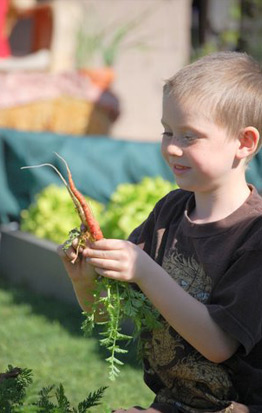
edible school yards
At farmyard, we feel it is time to help our youth make the important connection that French fries are potatoes, ketchup is made from tomatoes, and eggs come from chickens. Because these are true examples, we are passionate about educating today’s youth on where their food is grown. Time and again, children think that their fruits & vegetables come from a magical back room in a grocery store. With so many of their present day meals being made from processed foods and served in shrink wrapped packages, how can we blame them?
When planting a garden, students learn the food lifecycle. They gain the understanding that from a seed a plant grows, is pollinated, set’s fruit, and goes back to a seed. In an edible schoolyard, children also have the opportunity to observe the garden’s growth and eat the products of their labors. They truly witness and experience the saying, “You reap what you sow”.
Establishing a Farmyard edible schoolyard- garden and interweaving it with curriculum, teaches children many invaluable lessons that are best explained through “hands-on” applications, rather than from a classroom book. Consider the possibilities… math; how many square feet in a garden and how many seeds are needed; in science, the effects of nutrients on plant growth; or in biology, how plants reproduce, are all questions that children can answer through participation in their school-yard garden. It’s easy to see how all classrooms can integrate the garden as a useful tangible teaching tool for their students.

edible school yards
At farmyard, we feel it is time to help our youth make the important connection that French fries are potatoes, ketchup is made from tomatoes, and eggs come from chickens. Because these are true examples, we are passionate about educating today’s youth on where their food is grown. Time and again, children think that their fruits & vegetables come from a magical back room in a grocery store. With so many of their present day meals being made from processed foods and served in shrink wrapped packages, how can we blame them?
When planting a garden, students learn the food lifecycle. They gain the understanding that from a seed a plant grows, is pollinated, set’s fruit, and goes back to a seed. In an edible schoolyard, children also have the opportunity to observe the garden’s growth and eat the products of their labors. They truly witness and experience the saying, “You reap what you sow”.
Establishing a Farmyard edible schoolyard- garden and interweaving it with curriculum, teaches children many invaluable lessons that are best explained through “hands-on” applications, rather than from a classroom book. Consider the possibilities… math; how many square feet in a garden and how many seeds are needed; in science, the effects of nutrients on plant growth; or in biology, how plants reproduce, are all questions that children can answer through participation in their school-yard garden. It’s easy to see how all classrooms can integrate the garden as a useful tangible teaching tool for their students.

